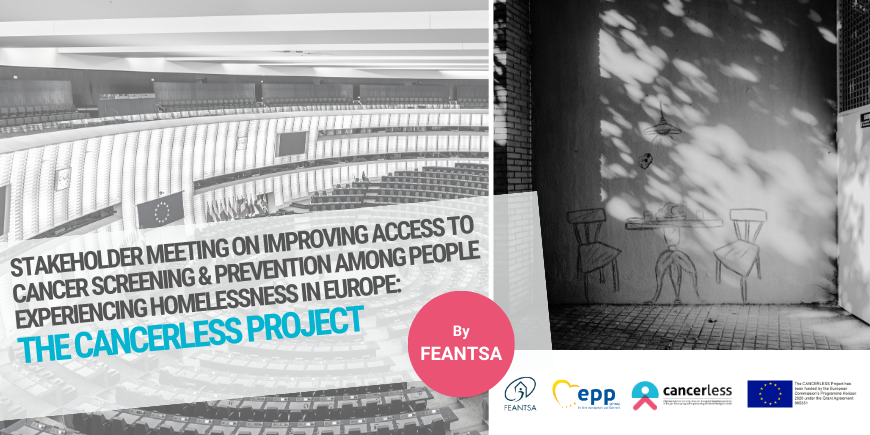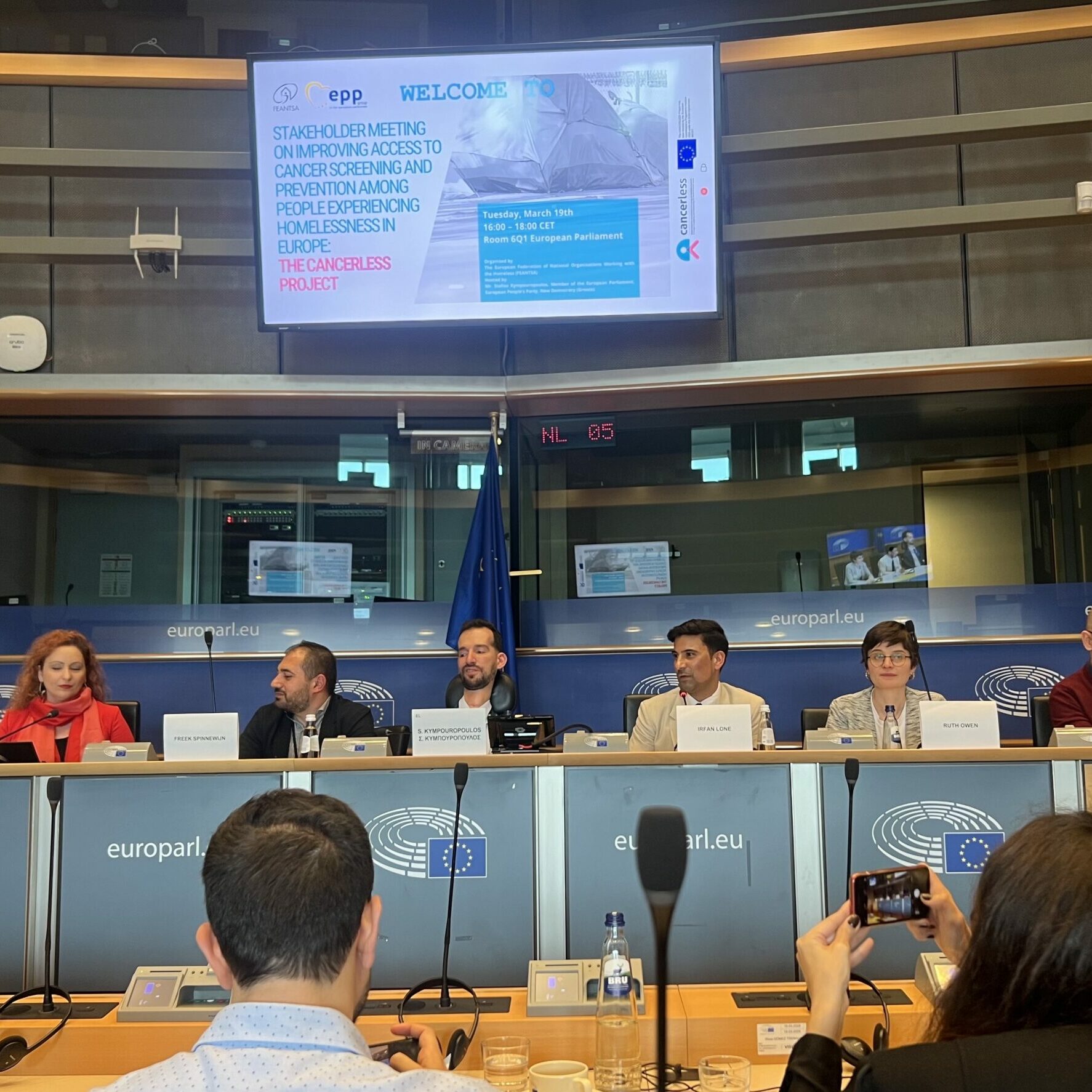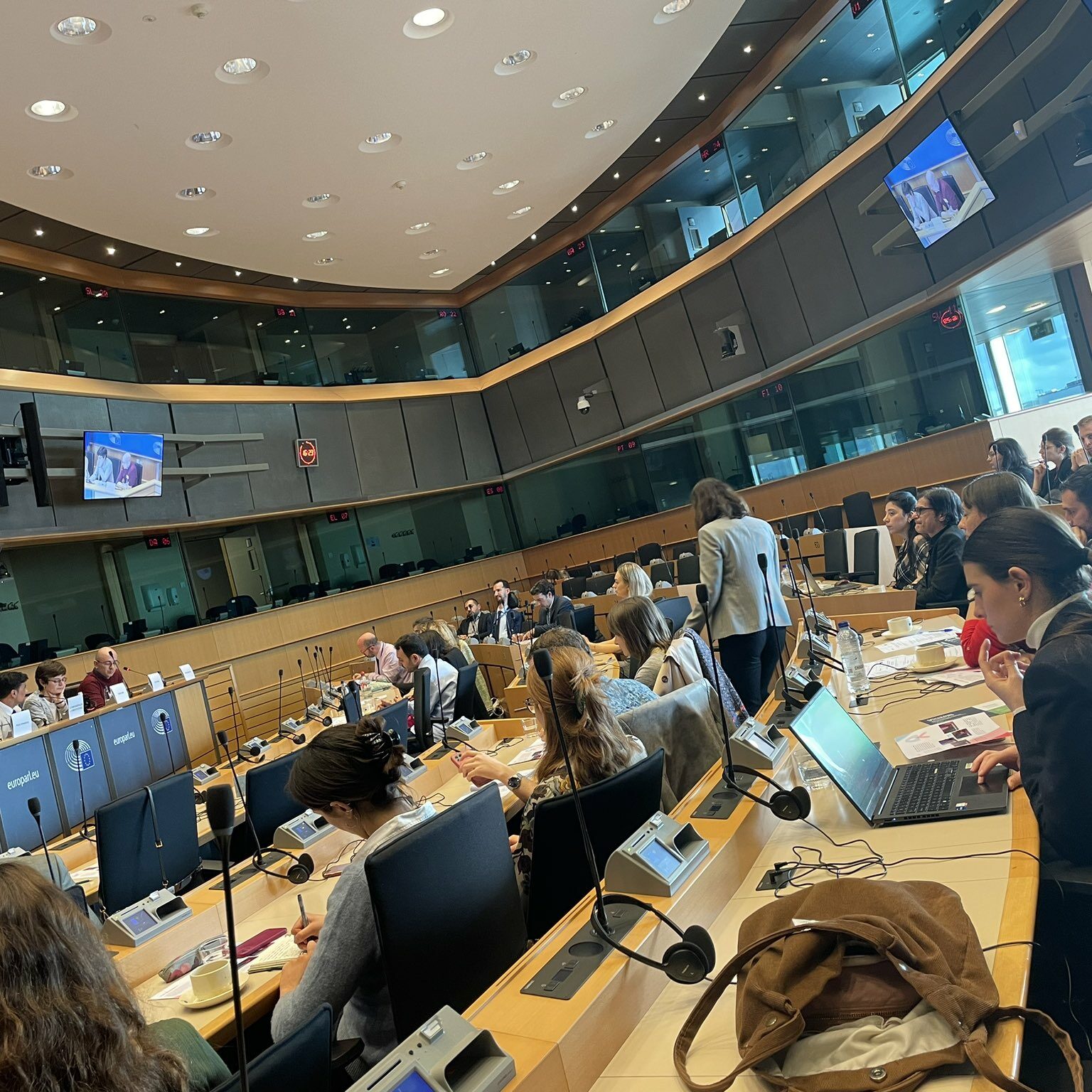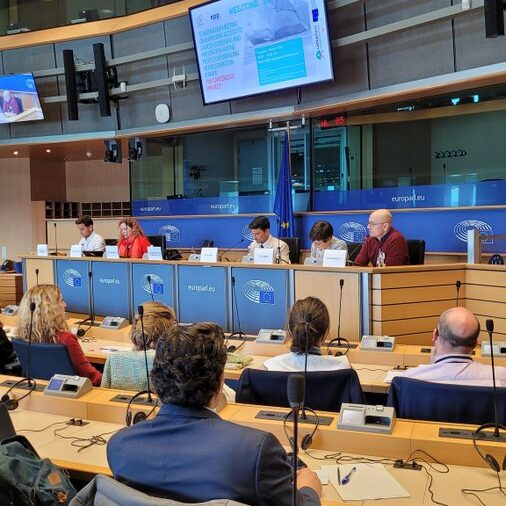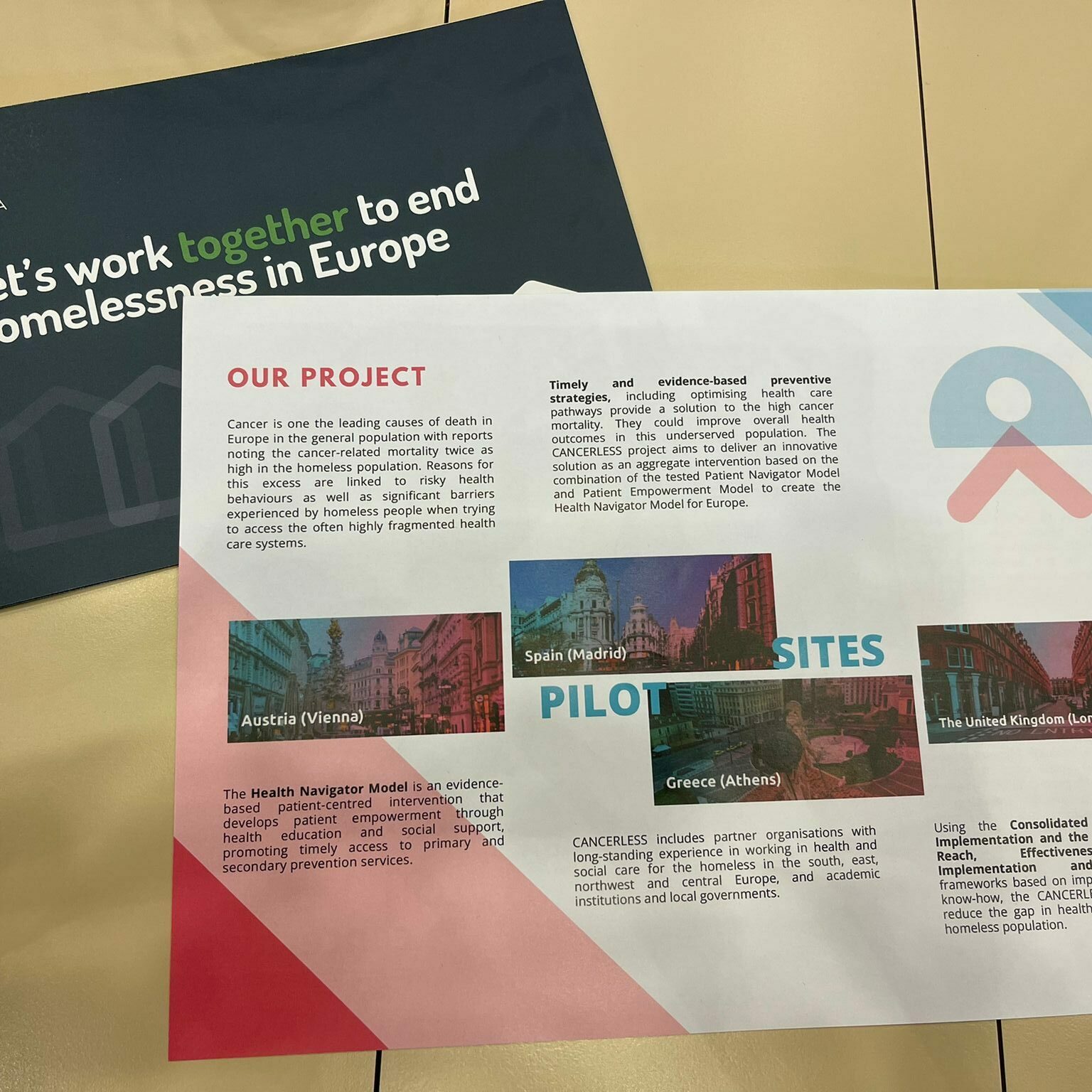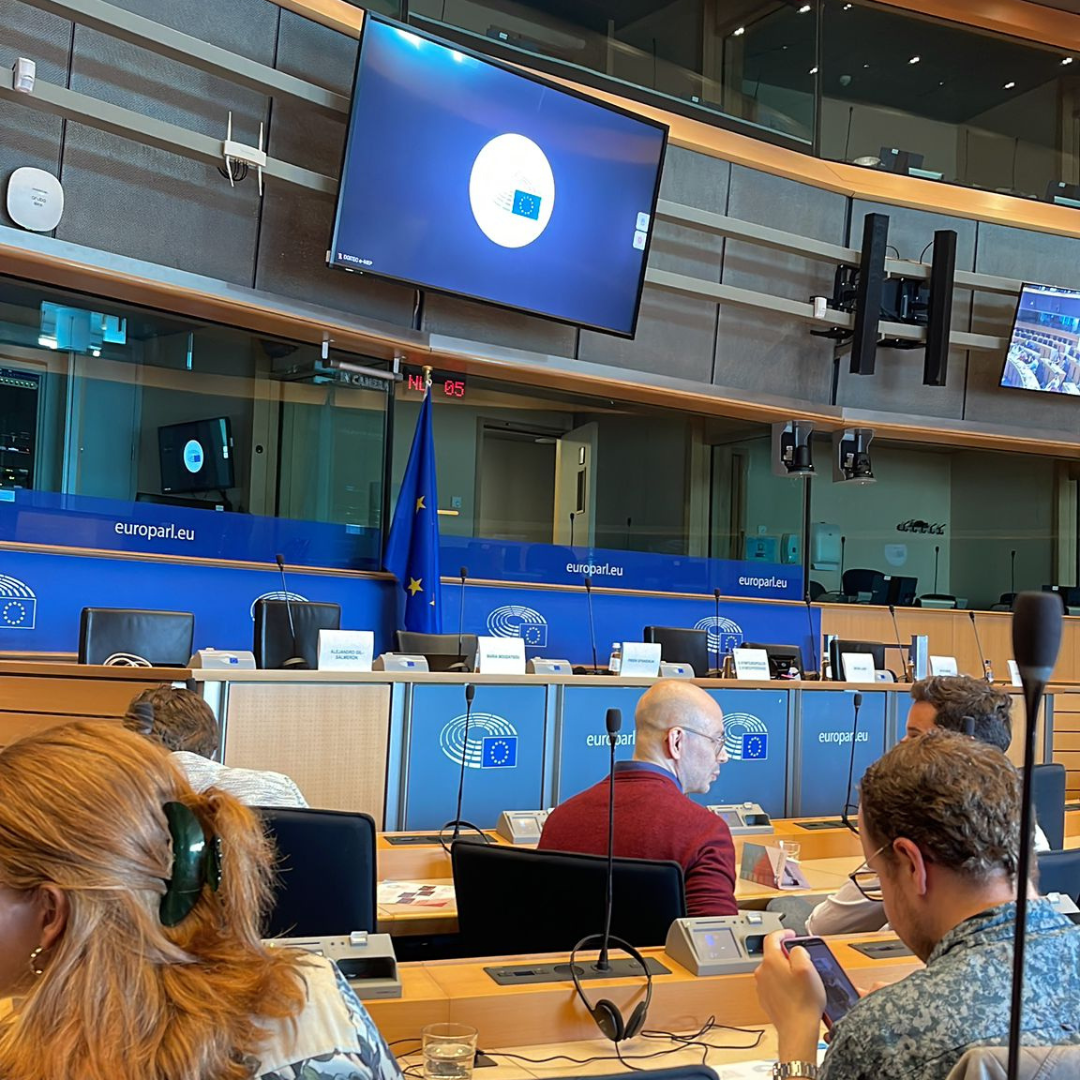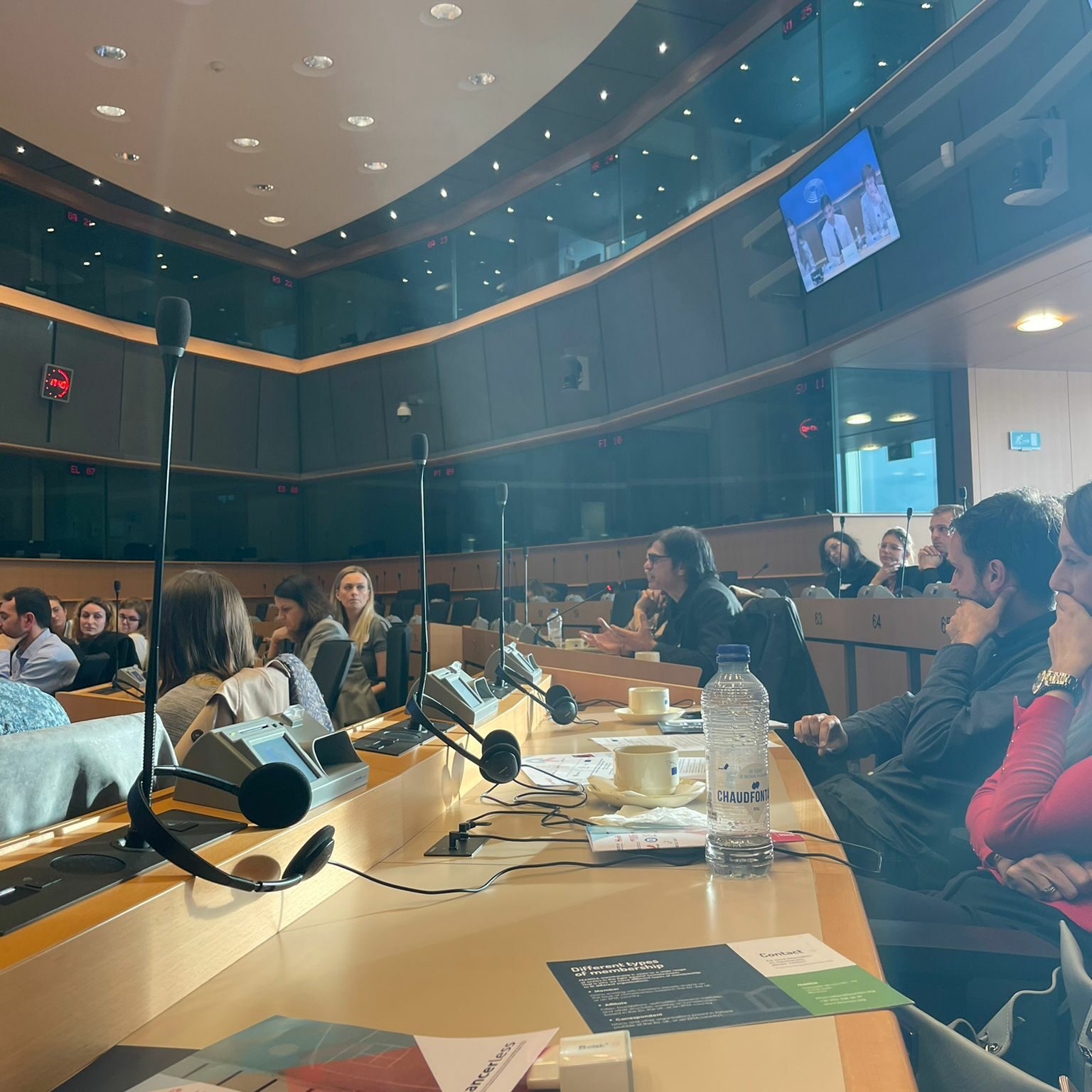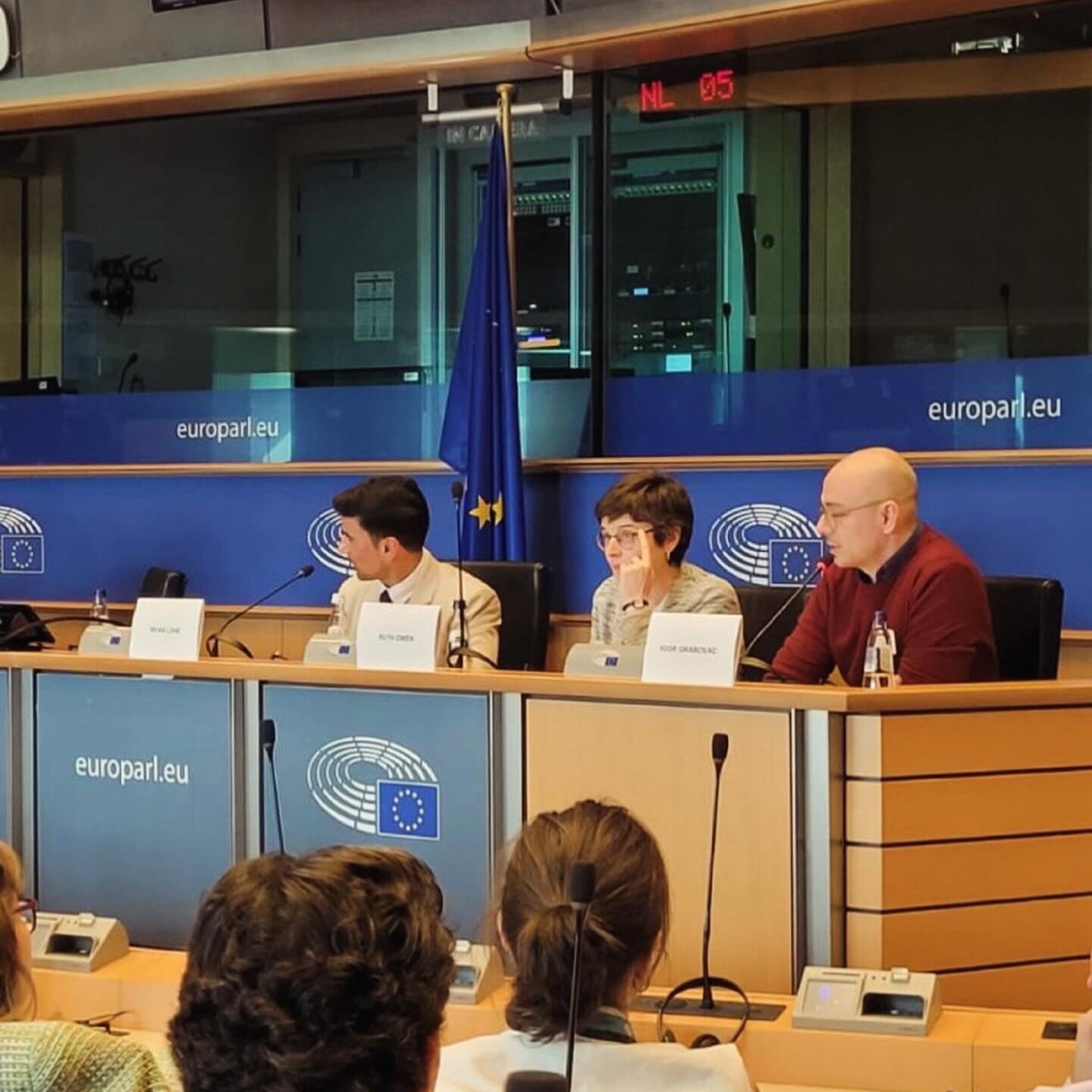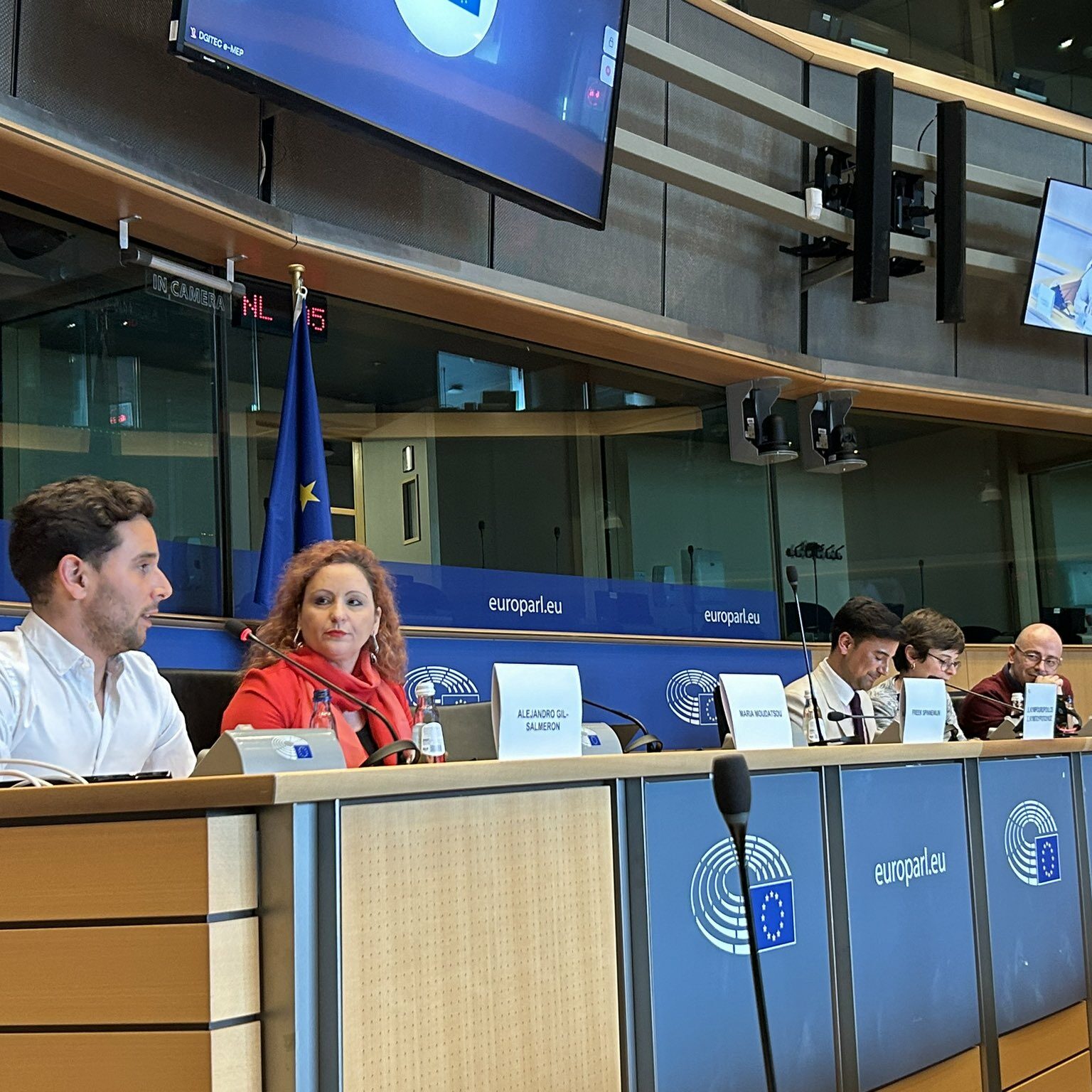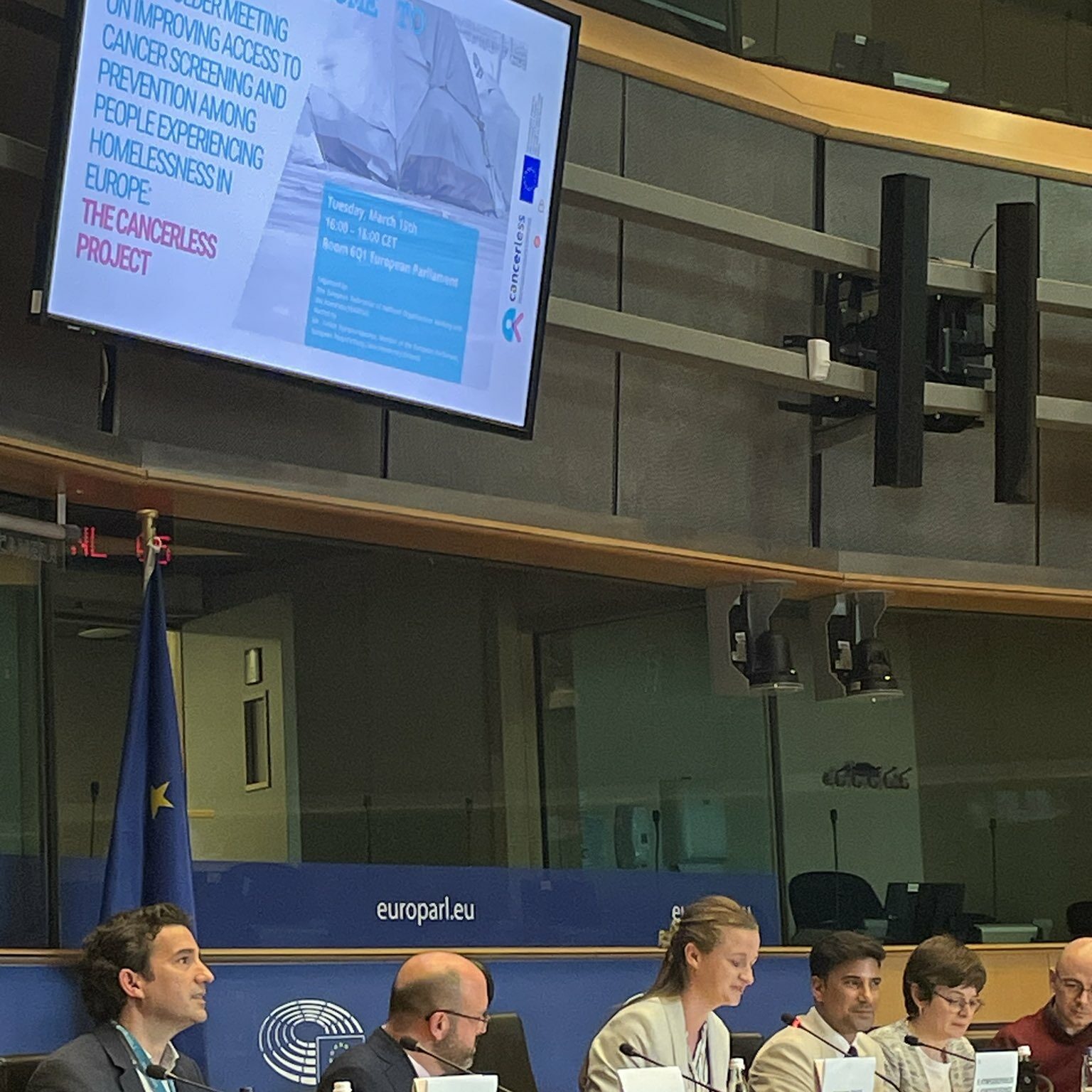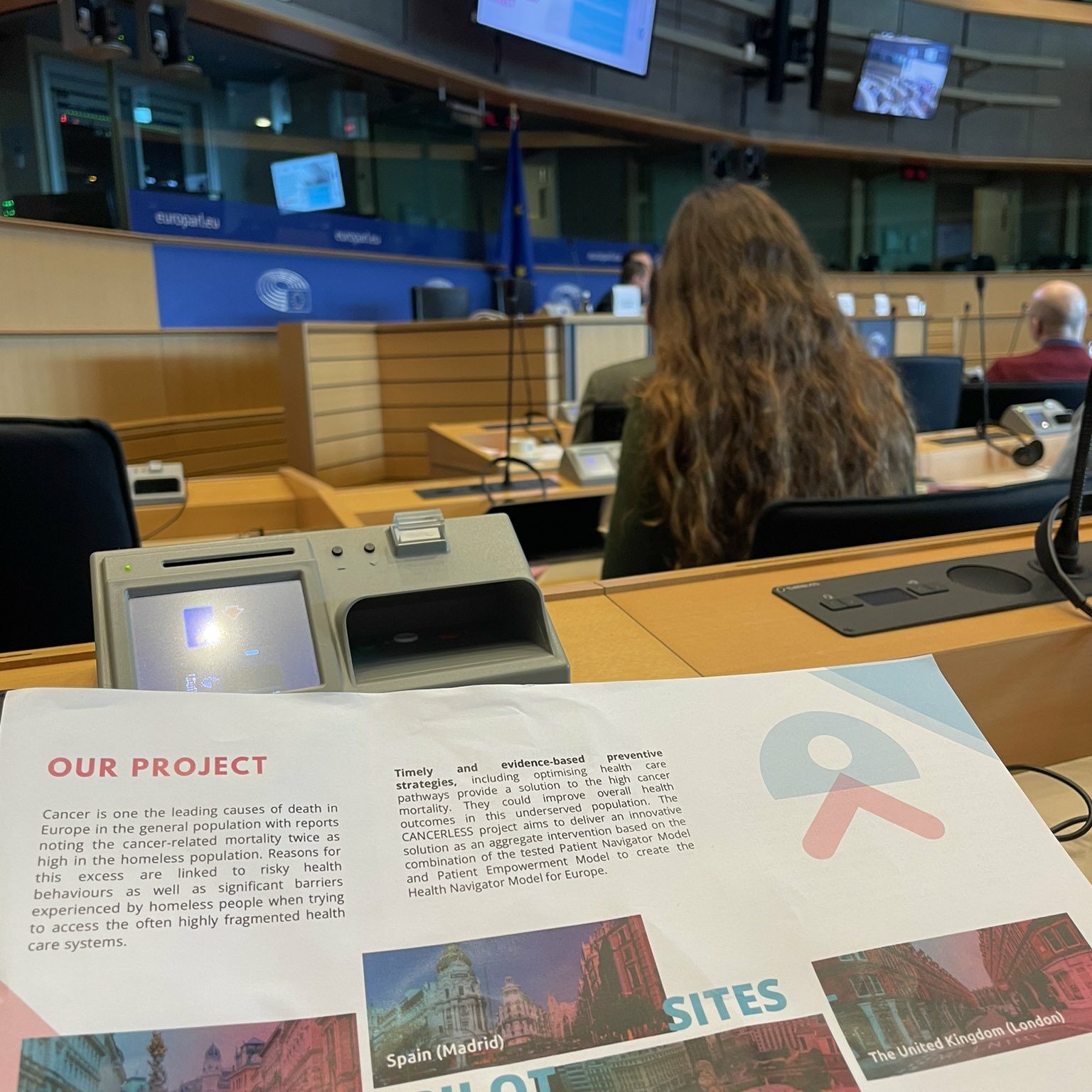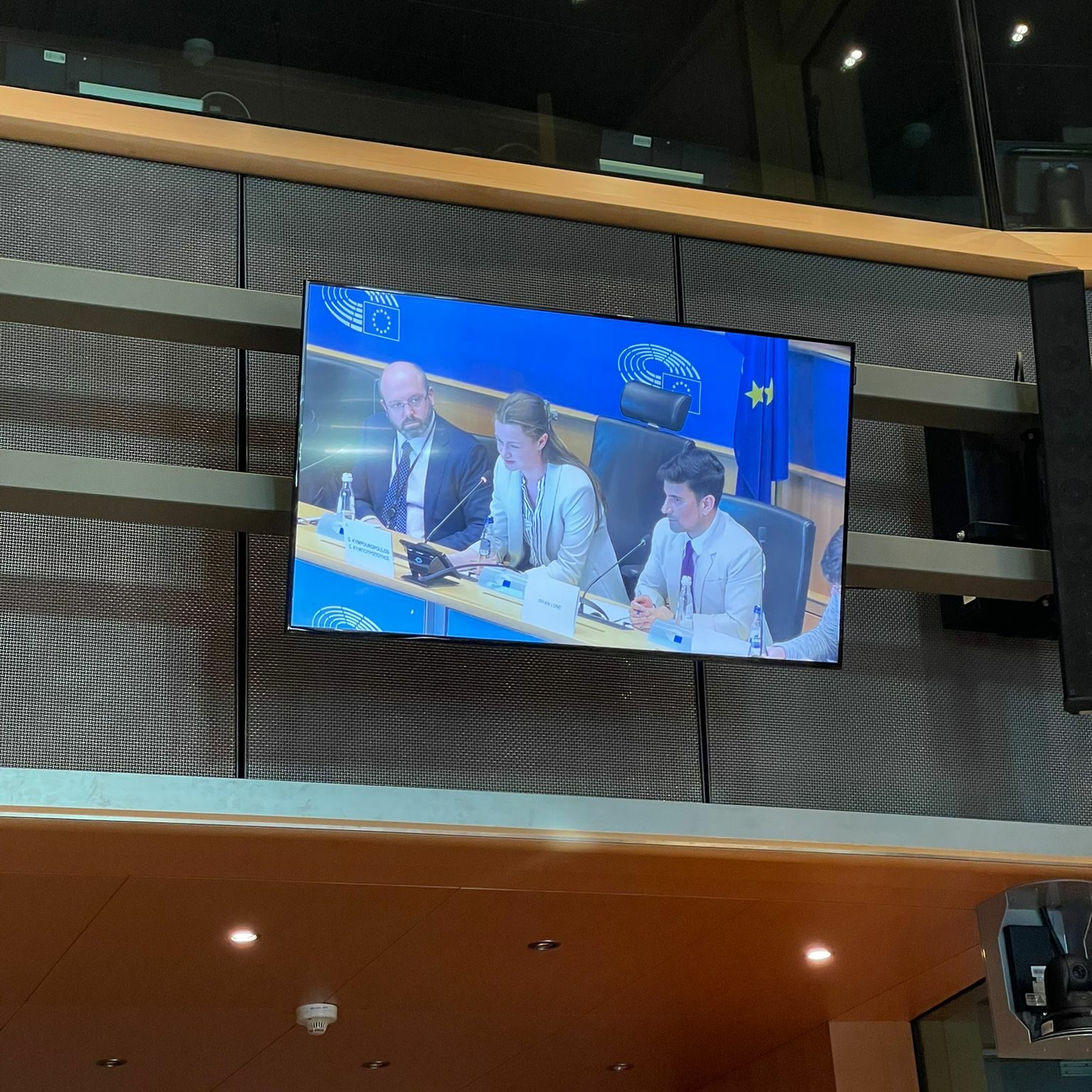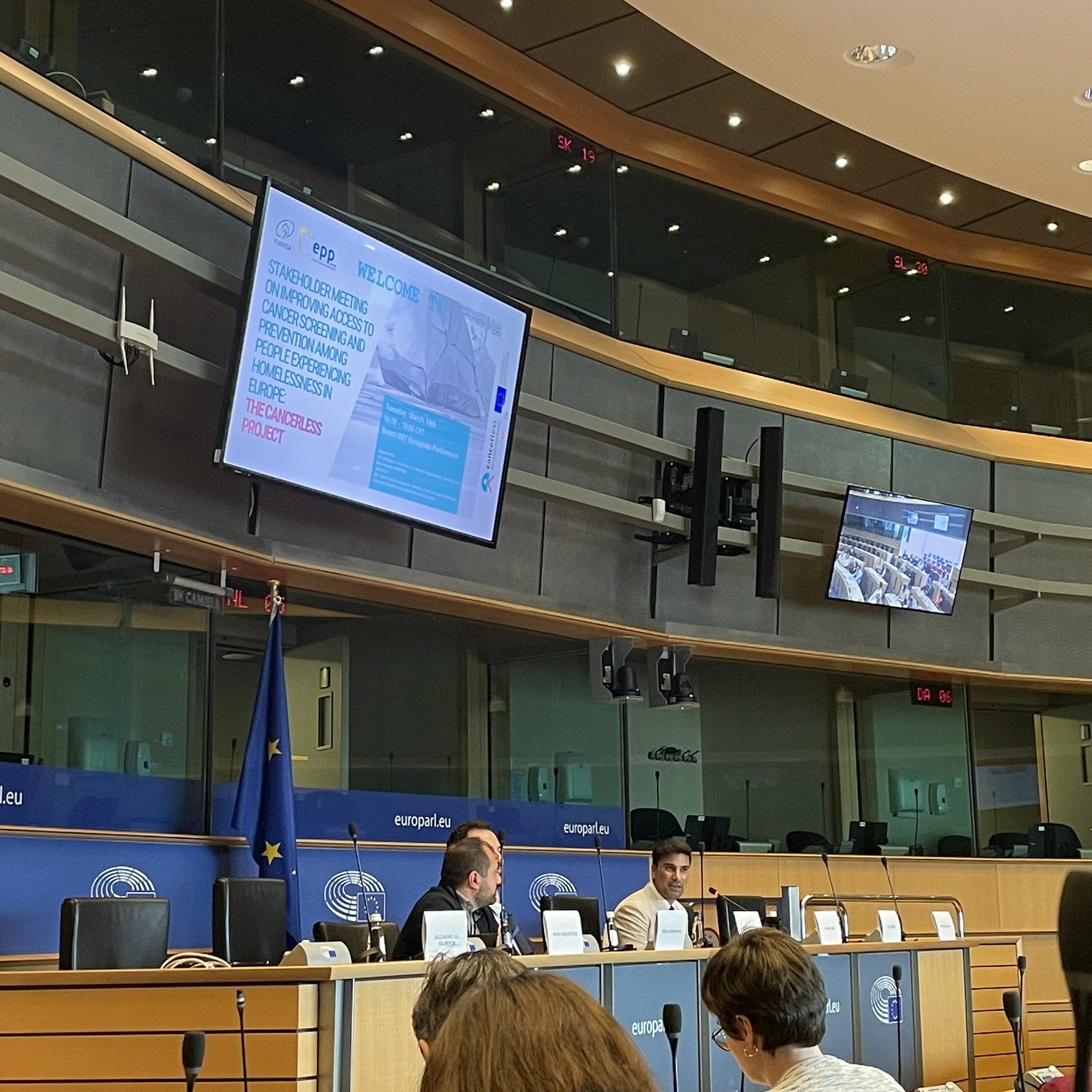Date: March 19, 2024
Time: 16:00-18:00 CET
Location: Room 6Q1, European Parliament, Brussels
Hosted by: Mr. Stelios Kympouropoulos, Member of the European Parliament, European People’s Party, New Democracy (Greece)
Organiser: FEANTSA (European Federation of National Organisations Working with the Homeless)
Speakers: Mr. Stelios Kympouropoulos – MEP, European People’s Party, New Democracy (Greece), Mr. Freek Spinnewijn – Director FEANTSA, Ms. Ruth Owen – Deputy Director FEANTSA, Prof. Igor Grabovac – Project coordinator, Medical University Vienna, Mr. Richard Price – Head of Policy, European Cancer Organisation, Mr. Francisco Rodríguez – Project Officer, Joint Research Centre, EU Commission, Mr. Alejandro Alejandro Gil-Salmerón – Senior Researcher, International Foundation for Integrated Care (IFIC) UK, Ms. Maria Moudatsou – Vice-president, PRAKSIS Greece, Dr. Martina Knapp– Health Navigator CANCERLESS Project & Medical Doctor, Medical University Vienna.
Chair: Irfan M Lone – Advisor Policy & Communications CANCERLESS – (FEANTSA)
Introduction
On March 19, 2024, the European Federation of National Organisation working with Homeless (FEANTSA) convened a stakeholder meeting in the framework of the CANCERLESS project at the European Parliament in Brussels. This gathering aimed to address the critical issue of cancer screening and prevention among individuals experiencing homelessness across Europe. This meeting was hosted my Mr. Stelios Kypouropolis (MEP, Greece), bringing together experts, policymakers, and representatives from the social, health, and cancer communities to discuss strategies for improving access to essential healthcare services.
This meeting, paved a unique opportunity to highlight the core of “Europe’s Beating Cancer Plan”, focusing on its Equity pillar in relevance with CANCERLESS project and Europe’s vision of “Cancer Free Europe”. Emphasising the rights-based approach to social and health care justice for people experiencing homelessness, this stakeholder gathering also spotlighted first-hand evidence-based information on unique barriers in health/cancer care, and to delineate the needs to address these barriers.
Key Objectives
The meeting focused on the following key objectives:
- Spotlighting the CANCERLESS Project: Participants delved into the project’s core mission, research findings, and its impact over the past three years. The CANCERLESS Project aims to enhance cancer prevention and early detection specifically among people experiencing homelessness in Europe.
- Policy Recommendations: The stakeholders engaged in robust discussions to formulate actionable policy recommendations. These recommendations are intended for the European Commission and other relevant stakeholders. The ultimate goal is to integrate these recommendations into broader healthcare policies and social justice initiatives across Europe.
- Sustainability & Synergies: The meeting focused on ensuring sustainability for the knowledge base generated throughout the project, particularly by encouraging adapting the Health Navigator Model in various disease and stakeholder domains. Additionally, the CANCERLESS consortium used this opportunity for calling for action and welcoming cancer and health care community to employ and amplify the results of CANCERLESS project in their advocacy, in reference to marginalised groups.
European Public Health Landscape, Priorities and Possibilities in Regard with Homelessness and Cancer
The outset of the discussion revealed some startling facts, such as the connection between cancer and homelessness and how these issues are forgotten in the realm of public health amid coexisting and competing priorities. One of the main causes is the conflicting social and public health demands that governments, communities, and health and political institutions must deal with in situations where resources are limited. Challenges like these can also become overwhelming to handle, especially when layers of poverty, violence, loneliness, illness, migration, climate change, and global warming are added. These are global realities that modern health systems must deal with, ensuring a fair approach in terms of serving those who bear the biggest burden.
Link Between Homelessness and Health
Homelessness disproportionately affects people in vulnerable situations, especially when it comes to health and access to healthcare services. Individuals experiencing homelessness already face reduced life expectancy due to harsh living conditions, lack of access to basic necessities, and limited healthcare resources. Addressing their health needs, including cancer prevention is crucial not only for health and socio-economic gains, but also in terms of socio-economic justice and overall wellbeing for societies.
Housing Stability as a Sensible Health Intervention
Cancer, as a major health concern, affects everyone regardless of their housing status. However, people experiencing homelessness encounter unique challenges in accessing cancer screening and preventive services due to reasons that go in parallel with their social status and existence. Ensuring their well-being requires targeted efforts and innovative approaches at all stages and across all levels.
Opening and welcome
FEANTSA director Mr. Spinnewijn thanked host MEP Kypouropolis, and welcomed alongside speakers, and attendees. He initiated the event with impactful remarks on homelessness and health in Europe. Stressing the importance of acknowledging housing as a key indicator for improving health screening access among those experiencing homelessness, he also urged stakeholders to collaborate for enhanced health and social equity. After the formal introduction from Mr. Spinnewijn, the host and keynote speaker for the event MEP Kypouropolis welcomed the participants, emphasising the necessity for better integration of health and social systems across member systems to provide optimal solutions for marginalized populations, particularly people experiencing homelessness. His powerful speech underscored the urgent need for comprehensive strategies to address health disparities and ensure inclusivity in European public health.
Section 1. Introducing CANCERLESS
The CANCERLESS Project video opened the session to familiarise the delegates with an overview of the project. This video presented a brief summary of the project, while emphasizing the urgent need to enhance access to cancer screening and prevention for homeless individuals.
Through the application of research and the Consolidated Framework, the CANCERLESS project aimed to lower the cancer burden and health disparities among people experiencing homelessness in Europe. Throughout its three-year long lifespan, the project envisioned to co-create and offer person-centred and evidence-based healthcare services that make it easier for people to have prompt access to high-quality cancer screening, prevention and treatments. As presented and elucidated by the project coordinator, Prof. Igor Grabovac from the Medical University of Vienna, CANCERLESS is a promising approach to lower cancer mortality rates among people experiencing homelessness by removing barriers to cancer prevention and screening services. Therefore, it supports and complements Europe’s fight against cancer and the European ambition of not leaving anyone behind in this work. The project aimed to achieve equity in cancer prevention and screening these goals through the implementation of timely preventive strategies and by optimising healthcare pathways.
The partners from International Foundation for Integrated Care (IFIC) UK represented by Mr. Alejandro Gil-Salmerón introduced the Health Navigator Model, which is a key component of the CANCERLESS Project. Alejandro highlighted that this is an essential and empowering model in providing individuals with relevant health and health service-related information. Through the active engagement of trained Health experiencing homelessness are guided through the complex healthcare system, ensuring timely screenings, education, and follow-up care. By eliminating barriers, this model empowers these individuals to take charge of their health and proactively participate in preventive screenings for cancer.
The CANCERLESS Project emphasizes patient empowerment. It recognizes that healthcare interventions must consider the living context of homeless individuals. A participatory design approach reduces the top-down nature of public health interventions, fostering collaboration and understanding while keeping people experiencing homelessness at the core.
Ms. Maria Moudatsou, as the representative from the Greek partners Praksis, presented their perspective and experiences on the implementation part of the project. Delegates were enlightened about the ground realities in reaching out to people on ground, including the care providers, institutes and actors involved in offering health care services. Furthermore, perspective on some key challenges and innovative solutions based on their experiences in regard with their geo-political and health care systems needs and situations were shared with the delegates. Homelessness often precedes or exacerbates various health conditions. Data from studies in Vienna, UK, Greece and beyond highlight the need for strategic designs that explicitly include people experiencing homelessness in healthcare initiatives.
Section 2. Panel Discussion: Policies & Priorities for Equitable Cancer Care in EU and Synergies with the CANCERLESS European Project
As a major component of Europe’s Beating Cancer Plan, the European Cancer Inequalities Registry (ECIR) tracks differences across EU Member States. This was introduced by Mr. Francisco Rodríguez, the representative of Joint Research Centre of the European Commission (JRC), a fundamental body for developing evidence for health policies for Europe. The ECIR employs an indicator framework to assess countries’ progress in cancer prevention and care. The registry helps with targeted actions by revealing patterns and inequities through the provision of trustworthy data. In order to guarantee equitable cancer prevention and care across Member States and regions, ECIR plays a crucial role in supporting policymakers by drawing attention to areas that require improvement and encouraging collaboration. The registry aims to include data from vulnerable groups such as, people experiencing homelessness and the Roma community, creating a roadmap for addressing cancer disparities. It advocates for housing as a fundamental pillar in tackling health inequalities.
This section presented by Mr. Richard Price, Head of Policy from European Cancer Organisation (ECO) focused on synergies of the CANCERLESS project with various other EU projects and how such initiatives are shaping the cancer policy across Europe. ECO contributed by sharing their scientific, strategic and advocacy inputs, while highlighting their engagement and involvement in various European projects in cancer care. This section also highlighted the health equity pillar of ‘Europe’s Beating cancer Plan’ and how CANCERLESS is a promising approach to improve the access to cancer prevention and screening across the EU. Furthermore, European cancer community could use the knowledge pool and data from CANCERLESS in their advocacy work. The highlight was on collaboration and joint action, emphasising one strong voice across stakeholder communities to amplify momentum when it comes to those who are underrepresented across cancer/health care and social domain.
In this section, presented by Dr. Martina Knapp, the health navigator from Medical University of Vienna shared her experiences on challenges reaching out to people, maintaining contact with patients, finding affordable solutions, and navigating health insurance complexities. She also highlighted how people experiencing homelessness remain excluded from many measures and solutions, including health policy. She concluded with a powerful note by emphasising the essential need to strengthen connections between the social and health sectors.
While health and homelessness may seem unrelated, they intersect significantly. Recognizing this connection is vital, while being explicit and operationalising each target group as clear as possible is a way forward for comprehensive healthcare and social justice.
Europe’s commitment to cancer prevention through the EU Cancer Plan sets a precedent. Implementation, however, remains a challenge within and across the member states and health systems. Initiatives like Horizon Europe opens the possibilities not only for the European Cancer Community, but also the stakeholders beyond EU to share best practices in this area. The Health Navigator Model, for example serves as a symbol of progress, demonstrating that tailored interventions can bridge gaps and improve health outcomes.
This section was presented by FEANTSA’s deputy director, Ms. Ruth Owen, who provided with a summary of the key takeaway messages for the participants to reflect up on. These key points
serve not only as a strong call for action, but an opportunity to work for equity in health, cancer, social justice and ending homelessness across Europe.
- Holistic Approach: Addressing cancer prevention among people experiencing homelessness requires considering social determinants of health, housing stability, and mental well-being.
- Education and Awareness: Tailored educational campaigns empower people experiencing homelessness to seek preventive care.
- Policy Integration: Policymakers must integrate CANCERLESS Project recommendations into broader health policies.
- Going further and building up on Europe’s Beating Cancer Plan
- Community Engagement: Community-based initiatives enhance trust and facilitate access to cancer services.
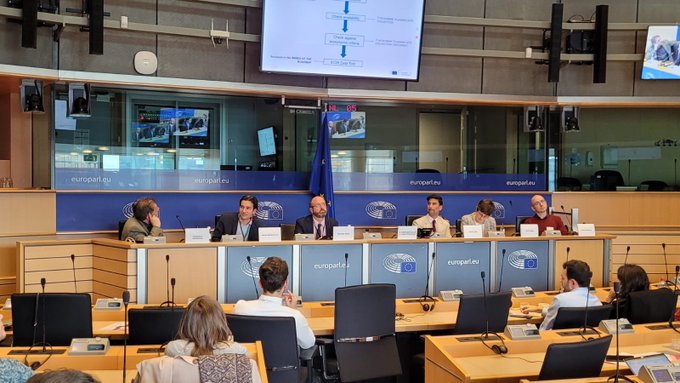
Conclusion
The CANCERLESS Project’s stakeholder meeting brought together important stakeholders in the area of public health, policy and social experts, and used this opportunity to underscore the urgency of improving cancer prevention and screening for people in vulnerable situations. In addition, this meeting called for collaborative stakeholder action and commitment to working towards broader and fair pay offs in public health domain, ensuring that no one is left behind in the “fight against cancer in Europe”. By facilitating the sharing of good practices, knowledge and adapting and implementing innovative models and approaches, the CANCERLESS project provided with a contribution in practice and in policy for achieving equitable and sustainable health for people experiencing homelessness in Europe and closing the gap in what concerns their access to cancer care.
Report by: Irfan M Lone
Global Health Specialist | Psycho-oncologist Advisor Policy & Communications for CANCERLESS EU FEANTSA

